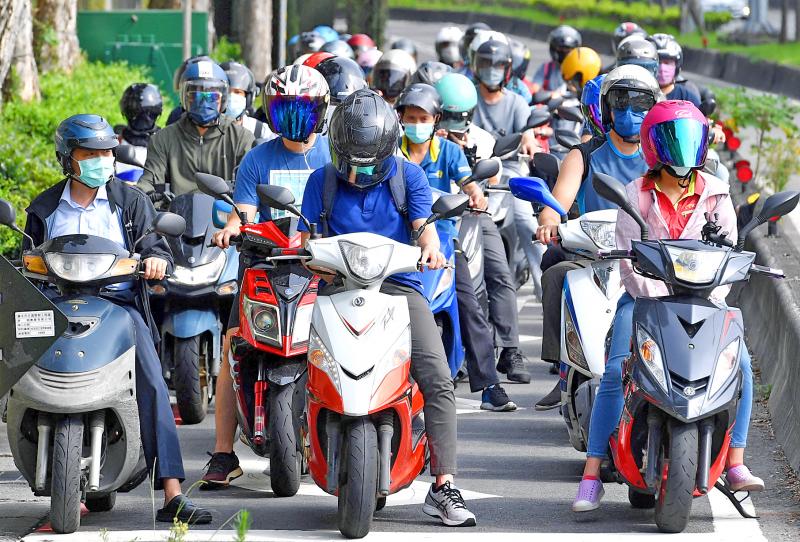The production value of Taiwan’s motorcycles and motorcycle spare parts in the first quarter of this year continued to grow, after hitting record highs in 2019 and last year, the Ministry of Economic Affairs said yesterday.
In the first quarter, output value reached NT$35.6 billion (US$1.29 billion), up 16 percent annually, due mainly to robust exports of gasoline-powered motorcycles and electric scooters, the ministry said in a report.
The motorcycle and spare parts industry’s output value reached record highs of NT$122 billion and NT$132.4 billion in 2019 and last year respectively, ministry data showed.

Photo: CNA
From 2012 to last year, production value grew by an average annual rate of 5.2 percent.
The main products in the industry were gasoline-powered motorcycles and scooters, followed by spare parts, e-bicycles and e-scooters, the report said, adding that production of emission-free e-scooters rose rapidly due to growing environmental consciousness and the rise of athleisure trends.
In the first quarter, the production value of gasoline-powered motorcycles and scooters rose 27.8 percent year-on-year, while that of e-scooters grew 29.8 percent, the largest growth among all product categories, the report showed.
However, sales of e-scooters plunged 60.8 percent year-on-year in the first quarter due to falling international oil prices and reduced government subsidies for purchases of e-scooters, it said.
Japan was the No. 1 destination for Taiwan’s motorcycle and spare parts exports before 2013, whereas from 2014 to 2018, the exports mainly went to the US, data compiled by the Ministry of Finance showed.
In the past few years, Taiwan’s motorcycle and spare parts have mainly gone to the Netherlands, the data showed.
Exports of motorcycle and spare parts to the Netherlands last year reached US$480 million, up 29.8 percent from a year earlier, while its exports to the US were about US$400 million, up 20.7 percent year-on-year, the data showed.

Sweeping policy changes under US Secretary of Health and Human Services Robert F. Kennedy Jr are having a chilling effect on vaccine makers as anti-vaccine rhetoric has turned into concrete changes in inoculation schedules and recommendations, investors and executives said. The administration of US President Donald Trump has in the past year upended vaccine recommendations, with the country last month ending its longstanding guidance that all children receive inoculations against flu, hepatitis A and other diseases. The unprecedented changes have led to diminished vaccine usage, hurt the investment case for some biotechs, and created a drag that would likely dent revenues and

Global semiconductor stocks advanced yesterday, as comments by Nvidia Corp chief executive officer Jensen Huang (黃仁勳) at Davos, Switzerland, helped reinforce investor enthusiasm for artificial intelligence (AI). Samsung Electronics Co gained as much as 5 percent to an all-time high, helping drive South Korea’s benchmark KOSPI above 5,000 for the first time. That came after the Philadelphia Semiconductor Index rose more than 3 percent to a fresh record on Wednesday, with a boost from Nvidia. The gains came amid broad risk-on trade after US President Donald Trump withdrew his threat of tariffs on some European nations over backing for Greenland. Huang further

CULPRITS: Factors that affected the slip included falling global crude oil prices, wait-and-see consumer attitudes due to US tariffs and a different Lunar New Year holiday schedule Taiwan’s retail sales ended a nine-year growth streak last year, slipping 0.2 percent from a year earlier as uncertainty over US tariff policies affected demand for durable goods, data released on Friday by the Ministry of Economic Affairs showed. Last year’s retail sales totaled NT$4.84 trillion (US$153.27 billion), down about NT$9.5 billion, or 0.2 percent, from 2024. Despite the decline, the figure was still the second-highest annual sales total on record. Ministry statistics department deputy head Chen Yu-fang (陳玉芳) said sales of cars, motorcycles and related products, which accounted for 17.4 percent of total retail rales last year, fell NT$68.1 billion, or

MediaTek Inc (聯發科) shares yesterday notched their best two-day rally on record, as investors flock to the Taiwanese chip designer on excitement over its tie-up with Google. The Taipei-listed stock jumped 8.59 percent, capping a two-session surge of 19 percent and closing at a fresh all-time high of NT$1,770. That extended a two-month rally on growing awareness of MediaTek’s work on Google’s tensor processing units (TPUs), which are chips used in artificial intelligence (AI) applications. It also highlights how fund managers faced with single-stock limits on their holding of market titan Taiwan Semiconductor Manufacturing Co (TSMC, 台積電) are diversifying into other AI-related firms.